They warn you it comes fast, but that’s not even close
In the 2000s, an inferno ripped through Victoria, Kevin Rudd became prime minister, and the war on terror began. Where were you for each of these events?
To celebrate this masthead’s 60th anniversary we are revisiting six decades of excellence in journalism. Today we look at news events in the 2000s.
TRAPPED IN THE PATH OF AN INFERNO
- By Gary Hughes. First published on February 7, 2009
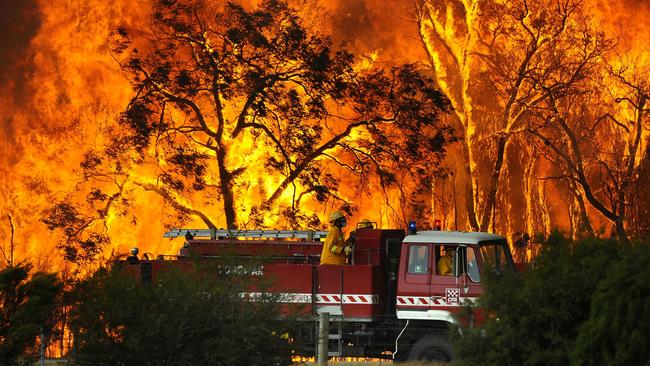
They warn you it comes fast. But the word ‘‘fast’’ doesn’t come anywhere near describing it.
It comes at you like a runaway train. One minute you are preparing. The next you are fighting for your home. Then you are fighting for your life.
But it is not minutes that come between. It’s more like seconds.
The firestorm moves faster than you can think, let alone react.
For 25 years, we had lived on our hilltop in St Andrews, in the hills northeast of Melbourne. You prepare like they tell you every summer. You clear. You slash. You prime your fire pump. For 25 years, fires were something that you watched in the distance.
Until Saturday.
We had been watching the massive plume of smoke from the fire near Kilmore all afternoon, secure in the knowledge it was too far away to pose a danger.
Then suddenly there is smoke and flames across the valley, about a kilometre to the northwest, being driven towards you by the wind. Not too bad, you think.
I rush around the side of the house to start the petrol-powered fire pump to begin spraying the house, just in case.
When I get there, I suddenly see flames rushing towards the house from the west. The tongues of flame are in our front paddock, racing up the hill towards us across grass stubble I thought safe because it had been slashed.
In the seconds it takes me to register the flames, they are into a small stand of trees 50m from the house. Heat and embers drive at me like an open blast furnace. I run to shelter inside, like they tell you, until the fire front passes.
Inside are my wife, a 13-year-old girl we care for, and a menagerie of animals ‘‘rescued’’ over the year by our veterinary student daughter.
They call it ‘‘ember attack’’. Those words don’t do it justice.
It is a fiery hailstorm from hell driving relentlessly at you. The wind and driving embers explore, like claws of a predator, every tiny gap in the house. Embers are blowing through the cracks around the closed doors and windows.
We frantically wipe at them with wet towels. We are fighting for all we own. We still have hope.
The house begins to fill with smoke. The smoke alarms start to scream. The smoke gets thicker. I go outside to see if the fire front has passed. One of our two cars under a carport is burning. I rush inside to get keys for the second and reverse it out into an open area in front of the house to save it.
That simple act will save our lives.
THE LEADER EXPECTED TO BRING LONG-TERM CHANGES
- By Paul Kelly. First published November 24, 2007
The Kevin Rudd era has begun. It is expected to last a long time. Rudd offers a new brand of leadership for Australia that breaks not just from John Howard but from Labor’s past.
Rudd enjoys a big majority, an unqualified mandate, a growth economy, a Labor Party invigorated by a surge of fresh talent and a demoralised Liberal Party that will take many years to recover.
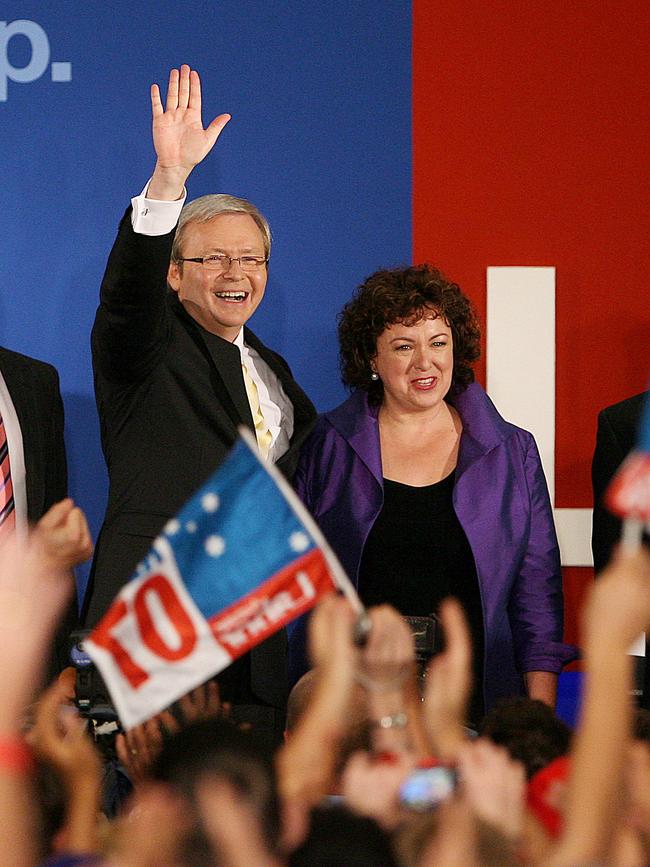
It is a watershed election. On the numbers, it is Labor’s greatest victory, excelling Gough Whitlam’s 1972 win, with the swing shading even Bob Hawke’s 1983 victory.
Rudd will govern Australia in a new fashion. He is a practical modernist pledged to move the agenda beyond the old ideological battles of the Howard period. Rudd is a centrist who will pitch to the mainstream and an aspiring agent of consensus seeking a more united nation.
He has no time for Labor’s true believer romance or its rich mythology rooted in the past. From today, Rudd will aim at securing Labor’s 2010 re-election. He presents as a long-haul leader, an incrementalist, the technocrat as PM, short on emotion and strong on practicality. How long Labor tribalism tolerates his style and authority defies prediction.
DEADLY DAY OF INFAMY
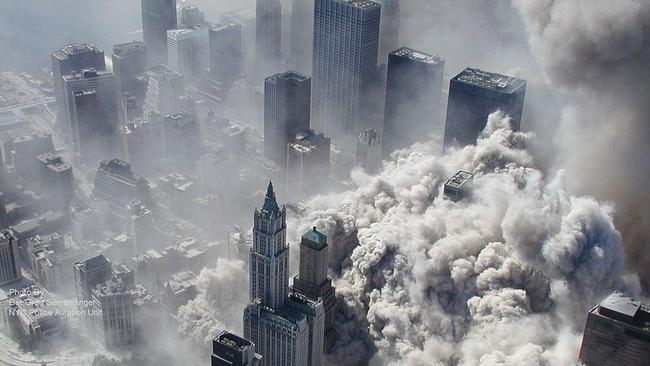
Day one of the not-so-brave new world dawned over a Manhattan shrouded in smoke. New Yorkers awoke to the grim realisation that it had not all been a terrible nightmare. It was a new day and the awful gap in the world’s most famous skyline was still there.
While Mayor Rudy Giuliani urged New Yorkers to go about their everyday lives, to offer a collective show of spirit in the face of faceless terrorism, no one was pretending that it was business – or life – as usual. The strain was obvious on every face.
‘‘You doing okay, man?’’ asks a stranger in the street. The same question would be asked time and again during the day as, in the hour of the city’s greatest adversity, normally brusque New Yorkers made time for each other. There was no better symbol of this than the sight of Mr Giuliani and his one-time rival for the US Senate, Hillary Rodham Clinton, standing together and vowing to rebuild the shattered city brick by brick.
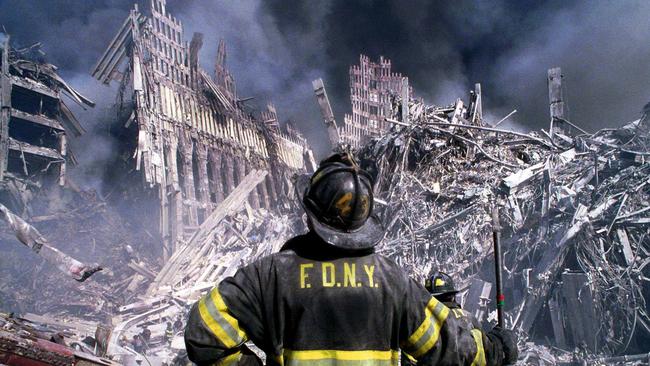
Where the World Trade Centre had stood, teams dug for survivors, and thousands who did not survive. Bear, a police dog trained to find buried bodies, had onlookers in tears as he toiled for 14 hours straight. Three taxi companies stripped the seats from their cabs, converting them into crude hearses to carry hundreds of bodies to makeshift morgues established through the city. ‘‘Trauma’’ read a handpainted sign over an emergency room set up in the Chelsea Piers entertainment complex.
On the other side of the piers, in the murky Hudson River, heaved potent proof of America’s shattered sense of security: the aircraft carrier USS George Washington. New Yorkers are used to seeing luxury yachts, such as Steve Forbes’s Highlander, in their harbour, not warships. Back on the streets, heavily armed national guardsmen backed up police. City office blocks posted at their front entrances security guards, who checked the identification of all people entering the buildings.
With city officials asking people to stay away from work if possible, midtown Manhattan was virtually deserted. The electronic ticker tapes at Times Square, which usually flash the prices of tech stocks, implored: ‘‘Please give blood’’. Suddenly stockmarket losses seem very unimportant. The incomprehensible images of people leaping to their deaths from the inferno that engulfed the World Trade Centre should end for all time jokes about broke stockbrokers jumping from skyscrapers.
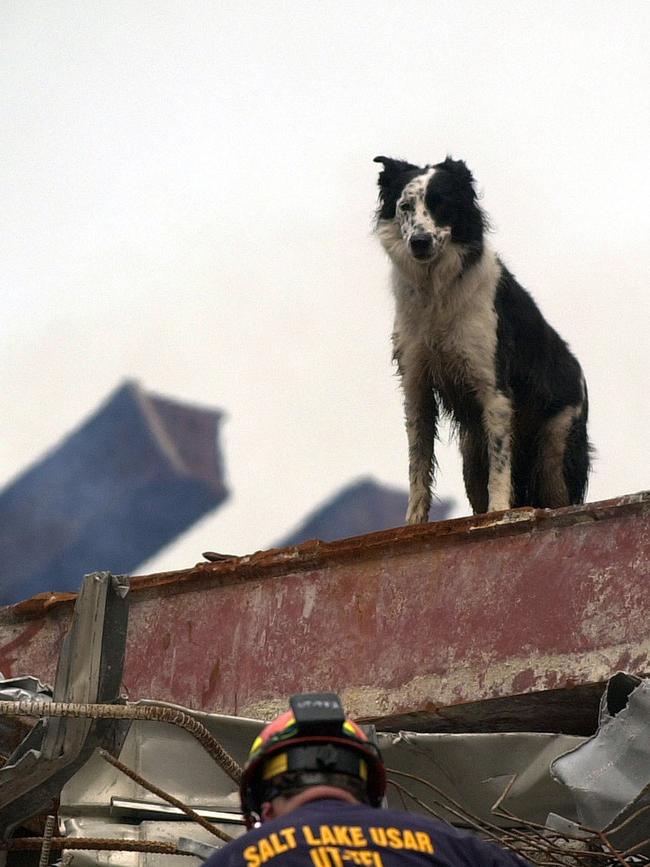
While law enforcement officials said there were no reports of lawlessness, shelves of supermarkets and corner stores betrayed a panicked populace. At the Gristedes supermarket in Chelsea, all bread, milk and bottled water was sold out by early morning.
Mr Giuliani vowed the World Trade Centre would be rebuilt but stressed it was too early to consider what form that reconstruction would take. It is highly likely the site will hold some sort of memorial, as is the case in Oklahoma City. ‘‘We’re not only going to rebuild, we’re going to come out stronger than we were before.”
A DECADE OF TERROR
- Reflections by Alan Howe, history editor
After serving eight years as 26th president of the United States, Theodore Roosevelt became the president of the American Historical Association, and in Boston on December 27, 1912, delivered its annual address. While discussing history, how it is recorded, how is it interpreted and by whom, he said in passing that “every reform movement has a lunatic fringe”.
Almost 90 years later, and just a few kilometres away, Egypt-born Mohamed Atta proved Roosevelt right. He was on board American Airlines Flight 11 that lifted off at 7.59am from Boston’s Logan Airport on September 11, 2001. The Boeing 767 was headed towards Los Angeles with 76 passengers and 11 crew. Also on board were five hijackers.
Atta’s gang consisted of 19 men in four teams. The other three also boarded west-bound jets, and with knives concealed in their shoes hijacked them, and turned them back east; two headed for New York’s World Trade Centre towers, one for The Pentagon and another for the Capitol.
By midday, more than 3000 Americans and many from other nations lay dead. Osama bin Laden’s al-Qa’ida terror organisation had declared war on the West years before with increasingly bold attacks, including on the World Trade Centre.
These “victories” awoke the lunatic fringe of Islam. Following September 11, the US declared the ongoing War on Terror which would see conflicts in Afghanistan, Iraq, Pakistan and Somalia, a revolution in Libya, and more civil war in Lebanon. Suicide bombers and car bombs claimed dozens each month, sometimes hundreds. Australia, which signed up for the War on Terror, was targeted and at 11.05pm on October 12, 2002, a suicide bomber detonated a bomb in Bali’s Paddy’s Pub. As panicked survivors carried the bloodied and burned to the street, a terrorist sitting in a van set off another outside the Sari Club. Of the 202 innocents killed, 88 were Australians.
Days later, Al Jazeera broadcast a recording it said was of bin Laden further threatening Australians: “You will be killed just as you kill, and will be bombed just as you bomb.” The retired FBI agent Ali Soufan later revealed al-Qa’ida funded the Bali operation.
Then prime minister John Howard said “Australia has been affected very deeply, but the Australian spirit has not been broken”. He had been in Washington on September 10, 2001, to mark the 50th anniversary of the ANZUS Treaty. Two days later, for the first time, he invoked that treaty. We were with America. George Bush described our prime minister as a “man of steel”.
More than a few Australians took that view when he went to the 1998 election with a controversial goods and services tax. It had cost John Hewson government in 1993. Howard lost 18 seats and a majority of Australians voted Labor, but the Coalition hung on.
Howard also had to contend with the MV Tampa. The Norwegian freighter had picked up 369 men, 26 women and 43 children – mostly Afghans – on a stranded fishing vessel in international waters north of Christmas Island. International law was clear: the Tampa captain had to sail to the nearest appropriate port – Merak on Java. An agitated group of Afghans threatened the captain and insisted they be taken to Australia. The ship and its crew of only 27 headed towards Christmas Island. The Tampa headed illegally to Australian waters, was stopped, boarded by SAS troops and the refugees transferred to Nauru. Many were settled in New Zealand, some in Australia and others elsewhere.
In the 2001 rematch between Howard and Kim Beazley, Howard increased his majority. A former policeman, Peter Dutton, defeated Democrats turncoat Cheryl Kernot to win the Queensland seat of Dickson.
Howard’s friend and hero Donald Bradman, Australia’s greatest sportsman, died early that year. Howard said Bradman “was not only the greatest cricketer the world has seen, by the measurement of many, the most skilled sportsman the world has seen”.
Other notable deaths this decade included Steve Irwin, killed by a stingray while filming on September 4, 2006. Four days later, racing driver Peter Brock died having miscalculated a bend in a forest outside Perth.
Howard eclipsed by three years Hawke’s time as prime minister and remains our second-longest-serving leader. But he was soundly beaten in 2007 by Kevin Rudd, even losing his seat, just the second leader to do so.
Rudd would be dethroned in a Labor coup, replaced by our first female leader, Julia Gillard, starting a decade in which the Lodge contained six different residents.

To join the conversation, please log in. Don't have an account? Register
Join the conversation, you are commenting as Logout